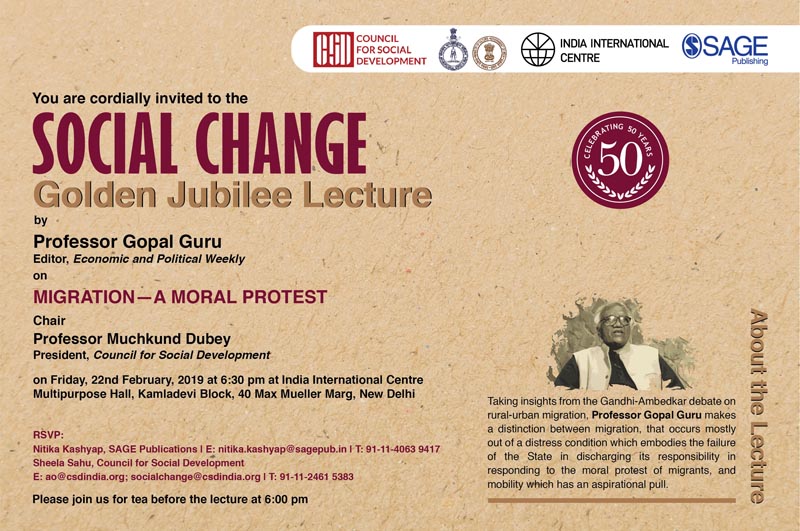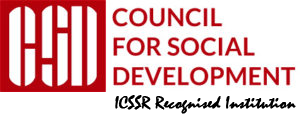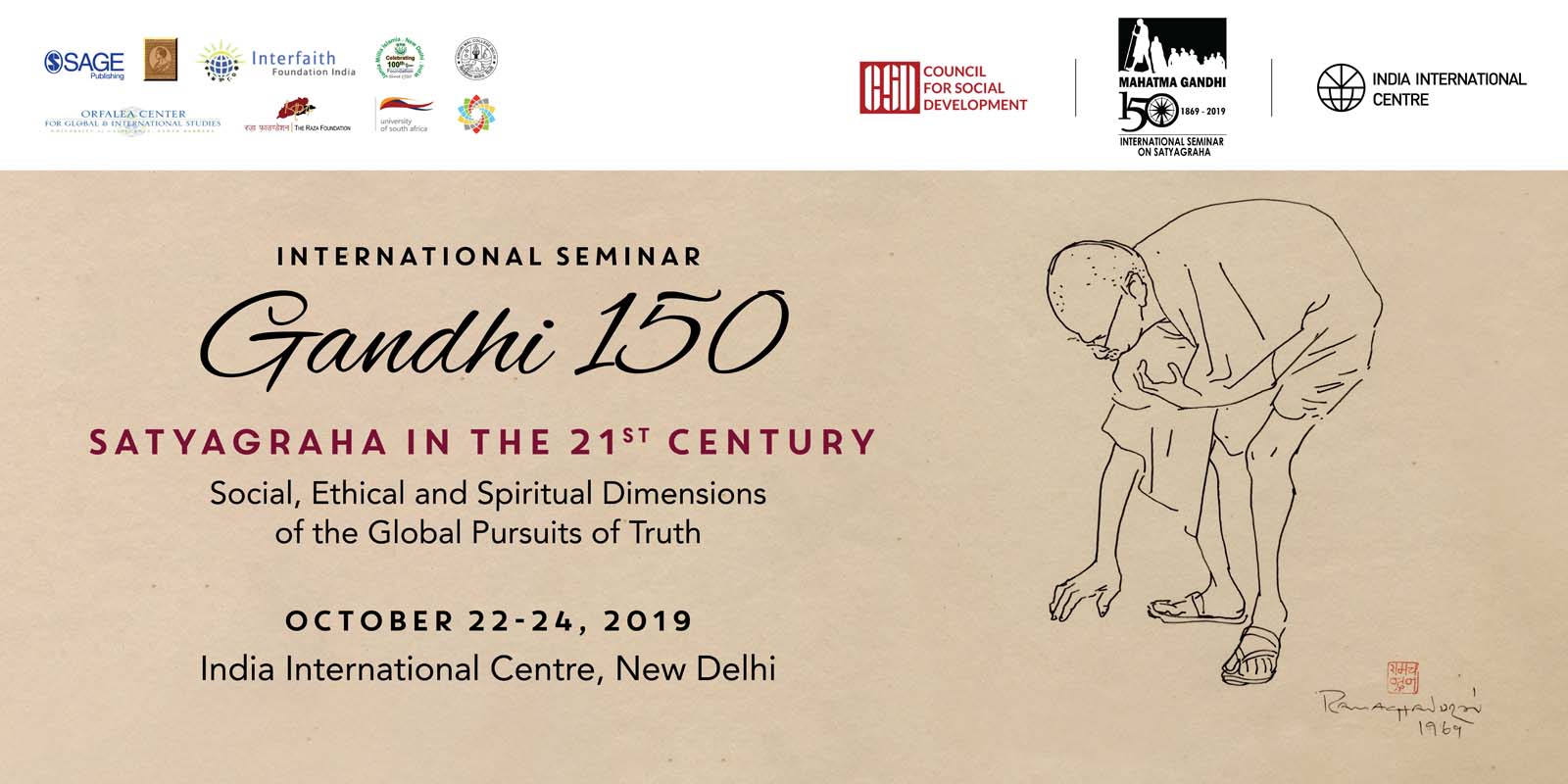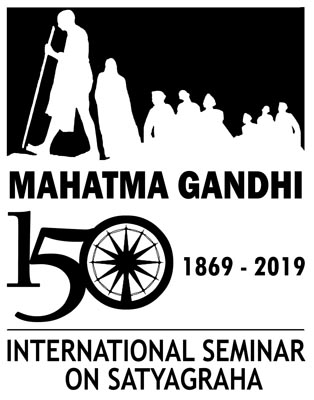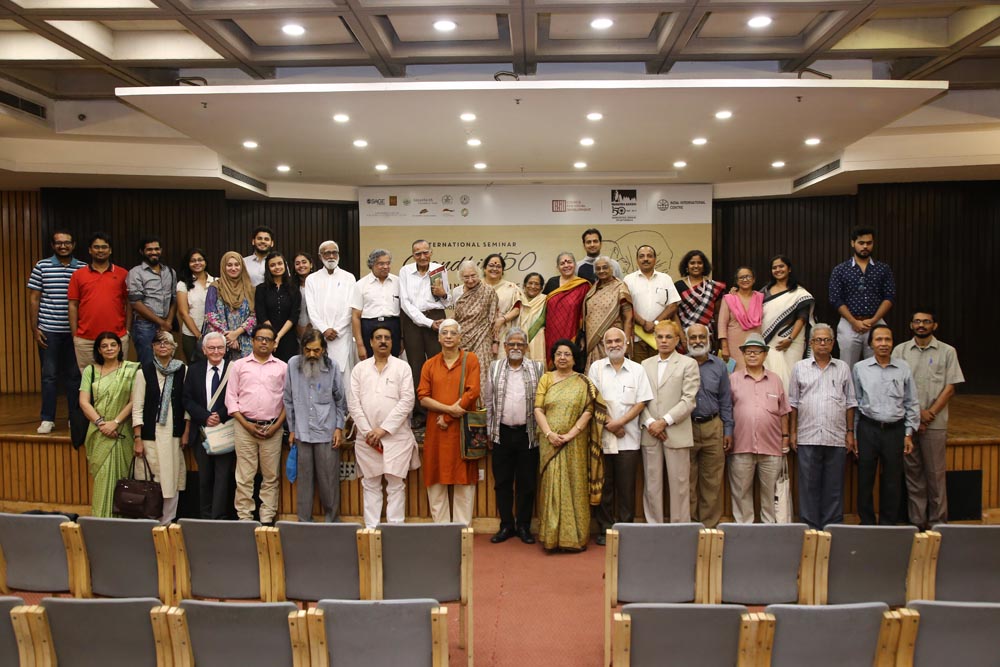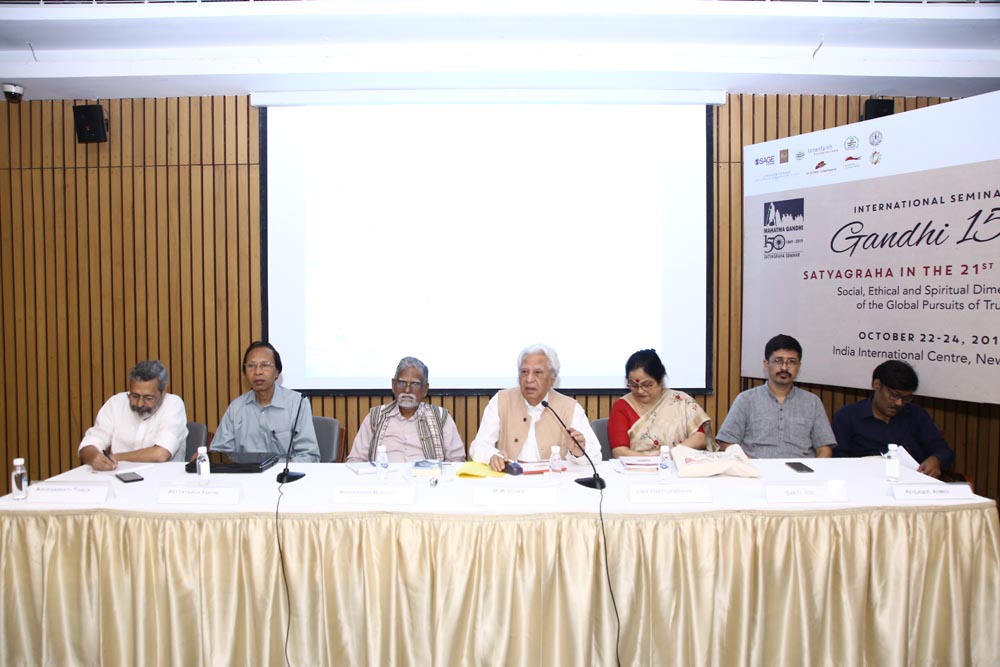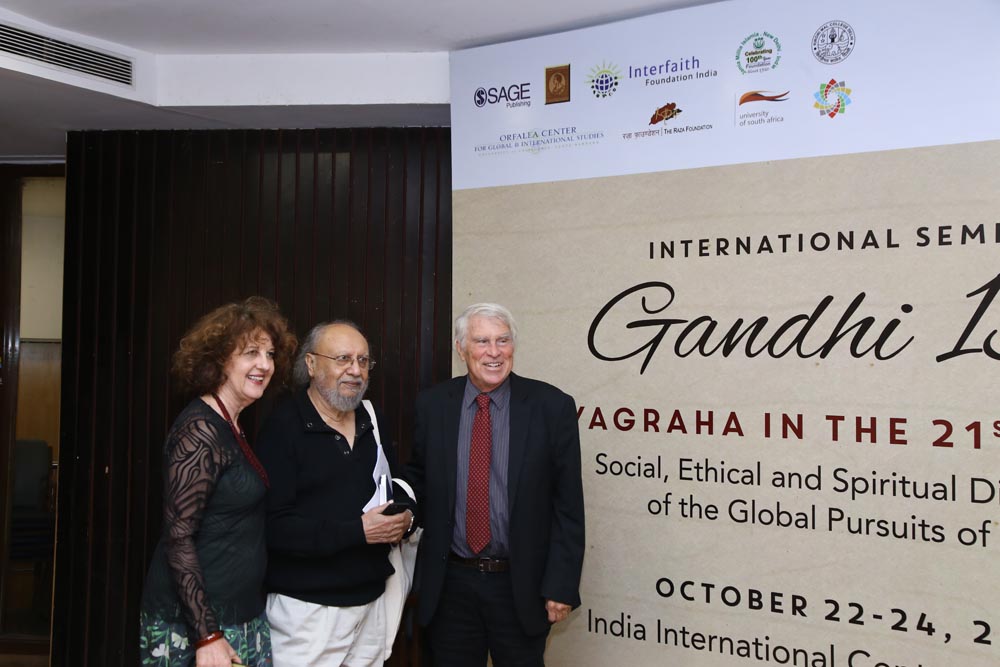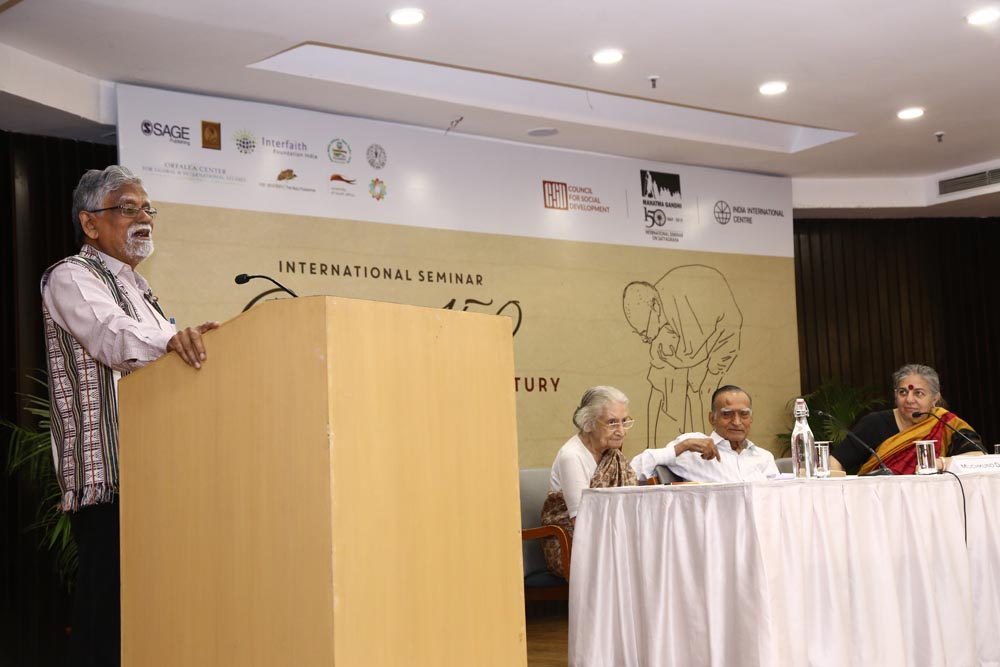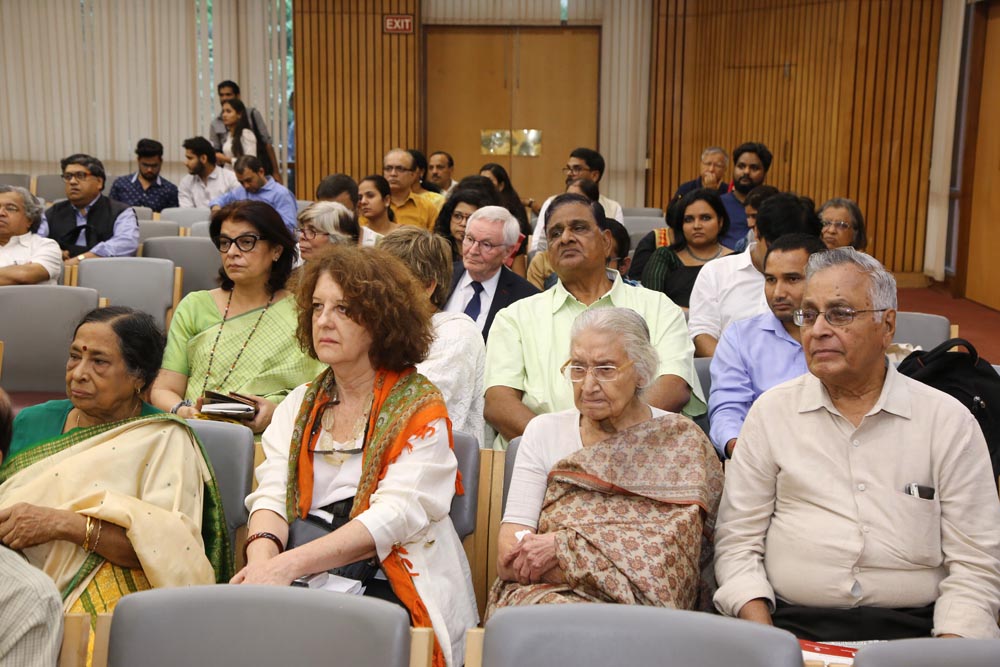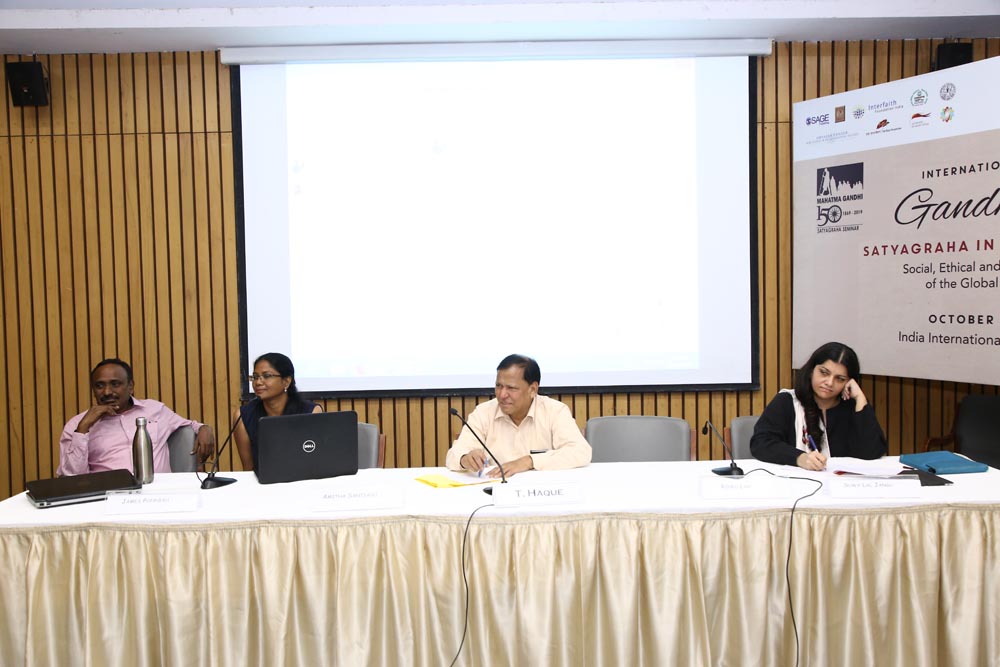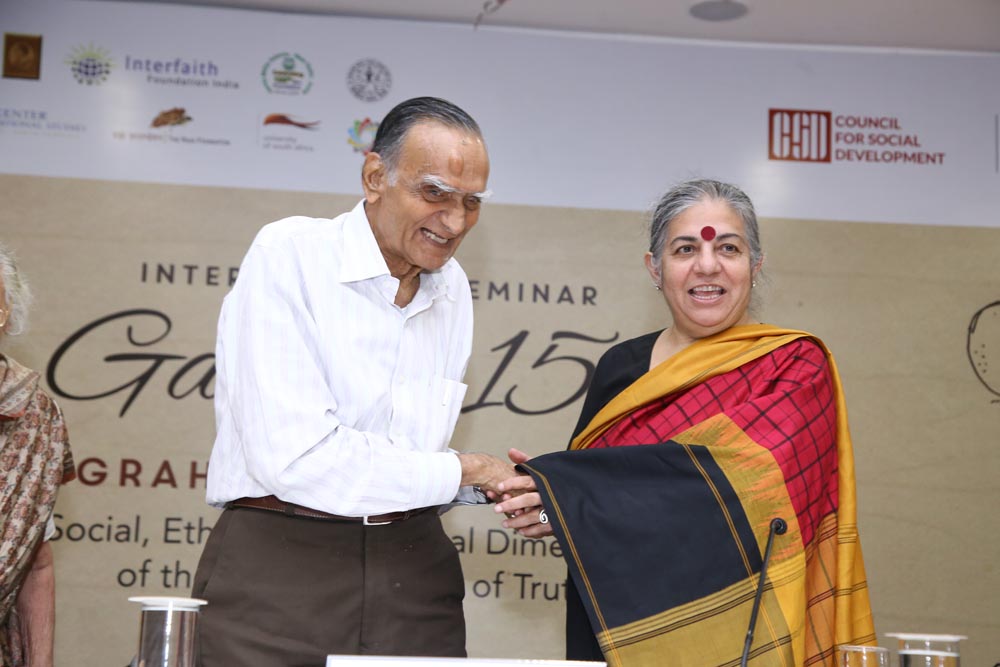
Invitation to Carry Out Telephonic Survey
Proposal Invited from Survey Agencies to carry out a telephonic survey of about 3,500 respondents for a study of Investor’s Awareness program. The agency should have prior experience of conducting telephonic survey across the states of India. The survey will be conducted in 19 states and will have to be completed within 45 days from the date of award of the project.
Interested agencies may submit their expression of interest by 31 July, through email or by post to
Council for Social Development, 53,
Lodi Estate, New Delhi – 110003,
Release of India Social Development Report 2018
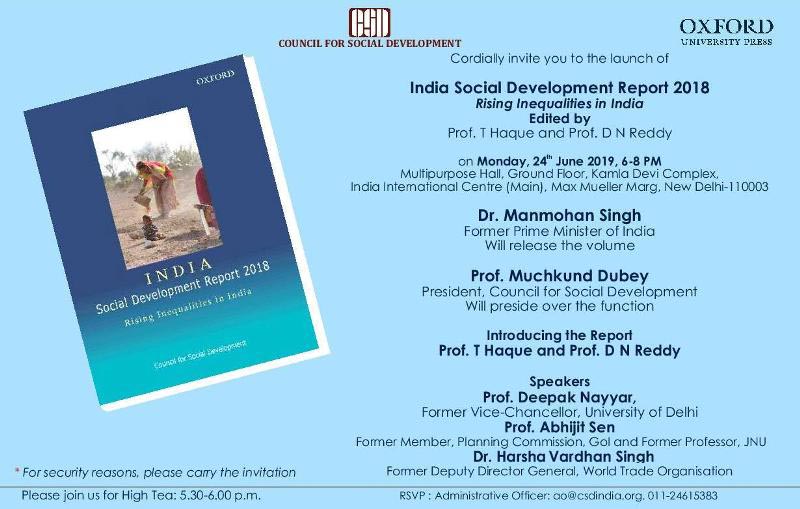
GANDHI at 150 – International Seminar
A Glimpse into the Minds of the Aged in terms of Guilt and Other Related Factors
The Social Development Forum of CSD, New Delhi invites you to a presentation on ‘A Glimpse into the Minds of the Aged in terms of Guilt and Other Related Factors’
Schedule of the Programme
A Glimpse into the Minds of the Aged in terms of Guilt and Other Related Factors
Speaker: Dr Meenakshi Saxena
Associate Professor (Retired), Department of Psychology,
Indraprastha College for Women
ICSSR Senior Fellow, Council for Social Development, New Delhi
Chair: Prof Manoranjan Mohanty
Distinguished Professor, CSD
Date: May 16, 2019 (Thursday)
Time: 3.30-4.30 PM
Venue: Durgabai Deshmukh Memorial Lecture Hall, CSD,
Sangha Rachna, 53 Lodi Estate, New Delhi 110003
Abstract of the Talk
Several studies have been reported describing the condition of the elderly in India and abroad. The major focus has been on the demographic picture, longevity, nutrition, disease and disabilities, physical and mental problems, elderly abuse, institutionalization, care-taker problems, and inter-generational conflicts. However, studies on the psycho-social aspects of the life of the elderly are scarce.
Investigations on the aged are highly relevant not only due to their ever increasing population, but also due to the great distress and unrest currently felt by them. In the present investigation, an attempt is made to have an insight into the mind of the elderly regarding their varied experiences of life. Such experiences are analysed with the help of qualitative data. They are also understood in terms of some quantitative measures, such as; personality, guilt and shame proneness, current affective states, and their locus of control.
Analysis of Quantitative data indicated that the male participants scored Average on the personality traits of Neuroticism, Extraversion, Agreeableness and Conscientiousness. They scored Low on Openness trait of personality. Females scored Low on Openness, as well as, Agreeableness. Males were significantly higher on Neuroticism compared to women. Both males and females had high Guilt and Shame Proneness, but they were not so high on the dimension of Shame Withdraw behaviour. The participants had General Positive Affective State and Self Assurance. Externality was their main locus of control. Males scored significantly higher on the Internality dimension of the locus of control compared to females. A rich array of intra (within dimensions of the same psychological test) and inter (between dimensions of different psychological tests) correlations were obtained.
Thematic Analysis of Qualitative data indicated multiple activities in which the aged engaged, cultural orientation, a transitional phase from religiosity to spirituality, pleasures and pride related to achievements of self and the family, moments of grief and disasters primarily related to the loss of a significant person in their life, and a clique of supposedly bad decisions, guilt, and regrets which they were extremely inhibited about sharing. However, it came out through several other questions related to their hopes for the future and the advice rendered to the younger generation.
Brief Introduction of the Presenter
Dr. Meenakshi Saxena has authored two books, Children: Voyage into Problem Space, and Kiran Bedi: The Kindly Baton, and co-authored the book ‘Demystifying Spirituality in Youth’. Apart from contributing several chapters in edited books, she has a number of published papers in reputed journals. She is guiding a number of students for their doctoral thesis and currently engaged in interdisciplinary studies in the fields of Spirituality, Geriatric Psychology, interventions aimed at Prison Reforms, and Delinquency.
Bandung Day Symposium 2019
Press Release
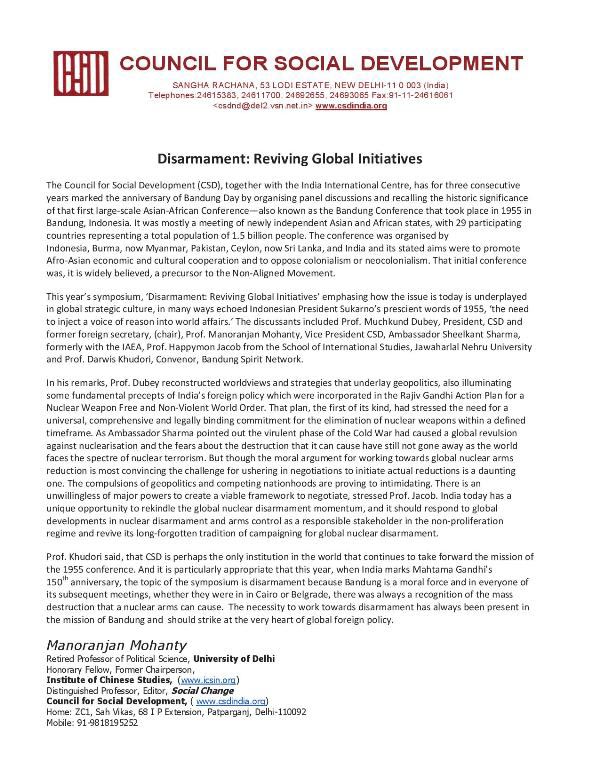
is this Azaadi? Everyday Lives of Dalit Agricultural Labourers in a Bihar Village
By Anand Chakravarti Retd. Professor of Sociology, Delhi School of Economics, University of Delhi
On 12 March 2019 (Tuesday) at 5.30 PM
Venue: Durgabai Deshmukh Memorial Hall, Council for Social Development 53, Sangha Rachna, Lodhi Estate, New Delhi-110003
Panelists:
K B Saxena, Distinguished Professor, CSD
Imrana Qadeer, Distinguished Professor, CSD
Ujjawal Kumar Singh, Professor, Department of Political Science, University of Delhi
Badri Narayan Professor, GB Pant Social Science Institute, Prayagraj
Chair: Prof Manoranjan Mohanty, CSD, New Delhi
About the Book: Has independence (azaadi) from colonial rule made a qualitative difference to the lives of landless agricultural labourers in Bihar, who constitute the poorest segment of the agrarian population in the state? This question, generated by the call of the author’s conscience more than the requirements of the discipline (Sociology) to which he belongs, informs the present monograph. Based on the testimonies of several Dalit labourers in a Bihar village, it highlights the betrayal of the promise of social, economic and political justice that underlay the struggle for independence- a promise that us at the heart of the Indian constitution. It describes the everyday problems faced by the labourers in accessing the basic necessities of existence, including food, clothing, shelter, health care and education. Their testimonies highlighting their tribulations, though confined to a single village, also reflect the dismal living conditions of their counterparts elsewhere in Bihar. The author argues that forces based on caste and class in the wider political economy of the state are antithetical to ameliorating the plight of those living in poverty.
About the Author: Anand Chakravarti retired as Professor of Sociology at the University of Delhi in 2006. He held the S.K. Dey chair in local Government at the Institute of Social Sciences, New Delhi, from July 2013 to June 2015. His publications include Contradiction and Change: Emerging Patterns of Authority in a Rajasthan Village (1975) and Social Power and Everyday Class Relations: Agrarian Transformation in North Bihar (2001).
International Women’s Day Documentary Screening on Girl in the River: The Price of Forgiveness
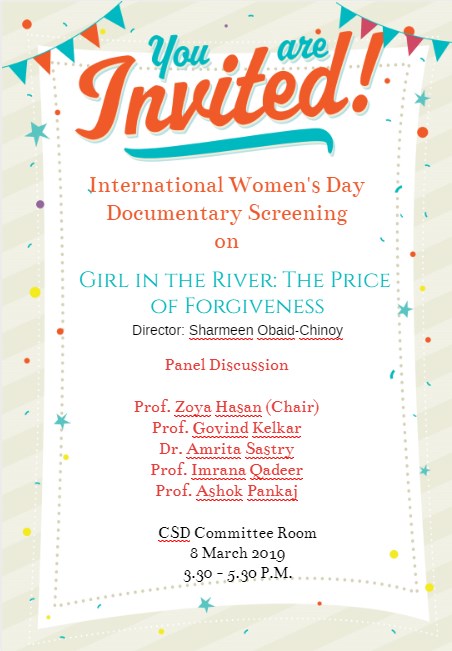 The film, A Girl in the River: The Price of Forgiveness (2015) is part of a series organised by the Council of Social Development to mark International Women’s Day on March 8. The critically acclaimed documentary film, directed by Sharmeen Obaid-Chinoy, shines a light on the heinous practice of honour killings in Pakistan and succeeds in bringing global attention to the issue. Films like this mark a paradigm shift by advocating stronger laws to end the impunity of relatives who murder women, seen as a source of family ‘dishonor’. A discussion in CSD following the 45-minute film questioned the very concept of honour and why it is assumed to be gender specific. Discussants asked whether the rise the religious fervor on the domestic and international stage has lead to the rise of such regressive practices. But the subjugation of women takes many forms, and not in the most obvious ways such as honour killings. To address this phenomenon, it was felt, one needed a deeper understanding of gender dynamics and changing structures of patriarchy which could be done both at a collective and individual level.
The film, A Girl in the River: The Price of Forgiveness (2015) is part of a series organised by the Council of Social Development to mark International Women’s Day on March 8. The critically acclaimed documentary film, directed by Sharmeen Obaid-Chinoy, shines a light on the heinous practice of honour killings in Pakistan and succeeds in bringing global attention to the issue. Films like this mark a paradigm shift by advocating stronger laws to end the impunity of relatives who murder women, seen as a source of family ‘dishonor’. A discussion in CSD following the 45-minute film questioned the very concept of honour and why it is assumed to be gender specific. Discussants asked whether the rise the religious fervor on the domestic and international stage has lead to the rise of such regressive practices. But the subjugation of women takes many forms, and not in the most obvious ways such as honour killings. To address this phenomenon, it was felt, one needed a deeper understanding of gender dynamics and changing structures of patriarchy which could be done both at a collective and individual level.
Photo Gallery
Discussion on Union Budget 2019
Venue: Durgabai Deshmukh Memorial Lecture Hall Council for Social Development
53, Sangha Rachna, Lodhi Estate, New Delhi-110003
Date: 19th February 2019
Session I: Macro Economic Overview of Union Budget (10.30 AM – 11.30 AM)
Prof Biswajeet Dhar
Prof Atul Sarma
Chair: Prof Muchkund Dubey
Session II: Social Sector Expenditure in Union Budget (11.45 AM- 1.30 PM)
Prof Imrana Qadeer
Prof K B Saxena
Prof Muchkund Dubey
Chair: Prof R Govinda
Lunch 1.30-2.15 PM
Session III: Agriculture and Rural Development in Union Budget (2.15-4.00 PM)
Dr T Haque
Prof Ashok Pankaj
Chair: Prof Praveen Jha
Social Change Golden Jubilee Lecture
Prof. Gopal Guru, Editor, Economic & Political Weekly will speak on Migration: A Moral Protest
Chair: Prof Muchkund Dubey, President, Council for Social Development
